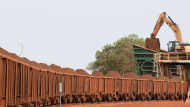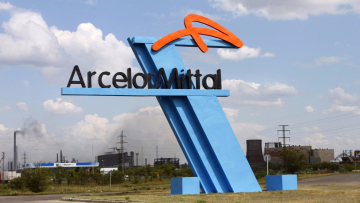Banks fail to substantially respond to communities impacted by ArcelorMittal on climate and human rights concerns
Julia Hovenier, Banks and Steel Campaigner, BankTrack
Cynthia Rocamora Industry Campaigner, Reclaim Finance
Filipa Lopes, Coalition Coordinator, Fair Steel Coalition
Caroline Ashley, Exeuctive Director, SteelWatch

Julia Hovenier, Banks and Steel Campaigner, BankTrack
Cynthia Rocamora Industry Campaigner, Reclaim Finance
Filipa Lopes, Coalition Coordinator, Fair Steel Coalition
Caroline Ashley, Exeuctive Director, SteelWatch
Banks financing steelmaker ArcelorMittal have failed to respond substantively to concerns raised by civil society, according to a new analysis of banks' responses to a warning letter, published today (1). BankTrack, Reclaim Finance, SteelWatch and the Fair Steel Coalition wrote to 20 banks warning that their support for ArcelorMittal could expose them to human rights impacts and decarbonization risks. Just two banks, BNP Paribas and Crédit Agricole, responded that they were engaging with the company on the impacts raised.
The letter to the banks, sent in June 2024, explained the serious human rights and climate impacts of ArcelorMittal, as documented in two recent reports by the Fair Steel Coalition and SteelWatch (2). The letter called on the banks to engage with ArcelorMittal on issues ranging from land grabs, destruction of ecosystems, loss of livelihoods, serious health problems, enforced disappearances, further investment in coal-based steelmaking, and backtracking on climate commitments. It asked banks to use their leverage and engage with the company to ensure it upholds its responsibilities to respect human rights, and fully aligns its operations with the Paris Agreement. It also invited banks to meaningfully engage in a dialogue with the Fair Steel Coalition.
The analysis of bank responses finds that none of the banks responded substantively to urgent human rights issues raised to them by affected rights-holders and their representatives. This follows an alarming trend identified by BankTrack in May: compared to 2022, when human rights allegations are raised to banks, there are fewer public responses, a decrease in quality of responses, and fewer instances of banks taking action to address the issues raised (3).
“The banks’ responses are unbelievable, and make me question their commitment to human rights. How can they continue to give ArcelorMittal money without even speaking to the communities who live on the land that ArcelorMittal mines? The communities are covered in dust, their forests are destroyed, and thereby they are impoverished while these banks and ArcelorMittal continue to profit. It’s pure extraction. Banks need to take human rights seriously, and engage with communities meaningfully.” said Eduardo Mosqueda, Director of Tskini, Mexico
Most of the banks refused to acknowledge their links with ArcelorMittal, citing client confidentiality. Three banks, Bank of America, Intesa Sanpaolo, and JPMorgan Chase, did not respond to the letter at all. Only two banks, BNP Paribas and Crédit Agricole, acknowledged that ArcelorMittal is a customer of theirs and responded they are actively engaging with the company. This demonstrates that some banks are willing to overcome barriers such as client confidentiality to address the concerns of affected rights holders, while others are not.
“I find it disrespectful that Bank of America, Intesa Sanpaolo, and JPMorgan have completely ignored our letter when ArcelorMittal Liberia destroyed all of my crops to make an access road for the construction of a dam, and my family and I have still not received any compensation. Refusing to engage with us shows that these banks value profit over human rights.” said Dada Konkah and his family, General Secretary at the Nimba Advocates for the Environment, Economic Empowerment and Resource Rights (NAEEERR), Liberia
BPCE, BNP Paribas, Crédit Agricole, ING and HSBC were among the few banks to mention climate in their response, reflecting the lack of commitment by banks to decarbonize the steel sector. While these banks highlighted their decarbonization targets for the steel sector, these have been found to be inadequate to prevent the expansion of coal-based steelmaking as they lack sectoral policies to restrict financing for steelmakers that are planning to develop new blast furnaces or to reline existing ones (4).
“The banks responded to us with vague promises, when we need urgent action. The time has passed for general engagement on sustainability with ArcelorMittal, a company that has spent 22 times more enriching its shareholders than it has spent on decarbonization in the last three years. With the leverage they have over the company, banks have a huge responsibility to push ArcelorMittal to be the climate leader it claims to be.” said Caroline Ashley, Executive Director of SteelWatch.
Notes to editors
-
The banks were identified thanks to the financial research carried out as part of the following report: Reclaim Finance, Steeling our future: The banks propping up coal-based steel, March 2024. The banks that were selected: Bank of America, BBVA, BNP Paribas, Citigroup, Commerzbank, Crédit Agricole, Goldman Sachs, Groupe BPCE, HSBC, ING, Intesa Sanpaolo, JPMorgan Chase, Mitsubishi UFJ Financial, Mizuho Financial, Royal Bank of Canada, Santander, SMBC Group, Société Générale, Sumitomo Mitsui Trust, UniCredit.
-
The Fair Steel Coalition is a coalition of 15 NGOs from the Global South and Global North united for corporate accountability in the steel sector. In April 2024, they published the Real Cost of Steel: Environmental racism, sacrifice zones and impunity in the supply chain. SteelWatch is a global NGO acting as a climate watchdog for the steel industry. In May 2024 they published ArcelorMittal Corporate Climate Assessment 2024.
-
Scores of 0, 0.5, or 1 were assigned to each criterion for every bank's response, following the methodology first outlined in BankTrack’s Actions Speak Louder report, and later integrated into BankTrack's Global Human Rights Benchmark.
-
As highlighted in its response, ING is the only bank that has adopted a policy on the steel sector, but it only restricts financing at the project level rather than at the corporate level.


